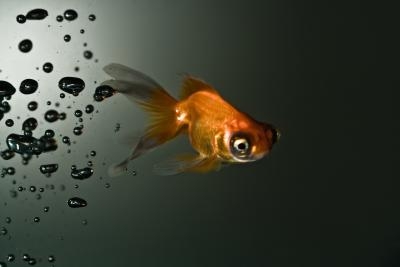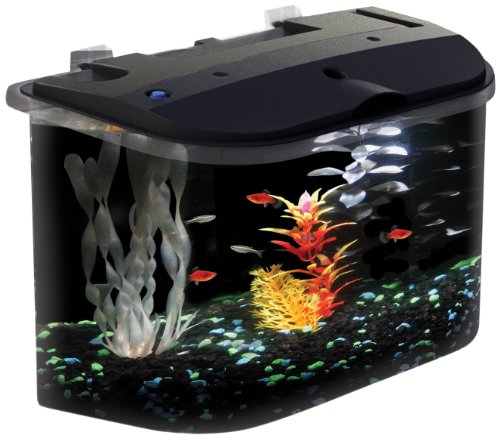
 For saltwater aquarium enthusiasts, the Lionfish, or Pterois as it is more scientifically known, has always held a position of esteem. Its fantastical appearance and outrageous beauty have made it a favorite of the hobbyists for years.
For saltwater aquarium enthusiasts, the Lionfish, or Pterois as it is more scientifically known, has always held a position of esteem. Its fantastical appearance and outrageous beauty have made it a favorite of the hobbyists for years.
Unfortunately, some of these venomous and predatory fish escaped into the waters of the Caribbean. They have proven to be particularly hardy and are now considered an invasive species that threatens many of the indigenous marine species of the Caribbean as well as those along the eastern seaboard of the United States.
 Beautiful, Striking and Deadly
Beautiful, Striking and Deadly
The Pterois genus encompasses nine species of venomous marine fish that are native to the Indian and Pacific Oceans. They are brightly colored as befits their adornment with a spectacular array of poisonous fins and spines. The fish are believed to live for approximately five to seven years but specimens in captivity have survived for over a decade.
Lions are noted predators and feed on everything from small fish to mollusks to each other. Pterois eat their prey whole using a their formidable mouth muscles to draw in a huge quantity of water with the prey. The lionfish themselves have few natural predators, other than themselves, of course.
The fish make a striking display in an aquarium but are not particularly good communal fish. Most usually, they are confined with others of the same species and of approximately the same size. Any divergences from these parameters usually results in one of the lionfish devouring the other.
 The Problem
The Problem
Pterois were originally imported to the United States as aquarium fish although a small community of Pacific Islanders also considered them a culinary delicacy. The situation remained so until 1992. In that year, s fate would have it, a particularly violent storm, Hurricane Andrew, broke a seaside aquarium and the six lionfish occupants were loosed on the unsuspecting denizens of the Atlantic Ocean off the Florida coast.
Over the following ten years, the lionfish flourished and eventually began to dominate the waters off Florida, Cuba and especially the Bahamas. The lionfish overpopulation became so great that many ichthyologists - people who study fish - had to stop their studies of other species and switch to the lionfish. There were simply no other fish to study.
The problem is that the Pterois are aptly named as lionfish. Like their namesakes, they are voracious predators and will tolerate no competition from other species. The lack of any natural enemies only exacerbates the situation. Even more troublesome is the fact that the last fact is not limited to larger predators. The typical microscopic, marine parasites of the Caribbean also do not have a taste for the lionfish.
 Some Solutions
Some Solutions
Various solutions have been presented. For instance, professional divers are encouraged to spear three to four lionfish on every expedition and the Florida Keys National marine Sanctuary took the unprecedented step of allowing the lionfish to be killed inside the perimeter of its protected territory. It is the only fish, thus far, to be so “honored.” In addition, there is an annual Lionfish Roundup where teams compete to see who can catch the most of the creatures and win a $3000 prize.
Other efforts revolve around the culinary world. While, in Asia, the lionfish is considered a delicacy along the lines of the blowfish, it is not particularly appealing to Westerners. The taste and consistency of the fish is actually quite appealing. In fact, it is quite similar to grouper, but the venomous reputation of the lionfish dissuades many would be gourmets.
Various environmental and governmental organizations are touting the fish as an excellent alternative to other over fished species. In particular, all over the Caribbean, there are incentives for restaurants to include the fish on menus and for fisherman to catch and destroy the fish as well as a public relations campaign to educate the public about the suitability of lionfish in a regular diet.
The only real threat to the lionfish population is predation by man. Unfortunately, the development of a sizable demand is necessary for this fact to solve the problem.
The Current Situation
The lionfish is indeed a hearty fish that preys on almost anything smaller than itself and it has a natural immunity to the marine parasites of the Caribbean. What makes the lionfish an even more dangerous threat to the indigenous marine life is its almost unique ability establish a presence in an open marine environment and then to reproduce on a monthly basis throughout the year. These fish are so creative that one scientist estimates that a full one quarter of a lionfish population would have to be killed every month to just keep the population constant.
The overall lionfish population has made significant inroads into almost every coastal reef area in the Atlantic Ocean from the Bahamas to North Carolina. It has been found as far east as Barbados and since the middle of 2011 has taken up residence off the coast of Louisiana.
The lionfish has demonstrated its ability to devastate a reef in a matter of weeks. Officials from the United States and he Caribbean countries fear that unless eradication efforts are redoubled, the lionfish will cripple many sectors of the fishing industry.
 Beauty and the Beast
Beauty and the Beast
The story of the Pterois, the lionfish, is ultimately one of reversals. Originally loved as a delicacy in its home waters, it was ignored for its beauty. Subsequently, it was illegally fished and brought to the aquariums of the Western world, most notably in the U.S.
Here, it was almost universally shunned as a food fish but was highly treasured for its beauty. Then a twist of fate released it into the wild where its role is due to be reversed again. Its beauty is now the herald of a pestilence and man will look towards his appetite to forestall this environmental crisis. In any event, the lionfish will continue to play his part in the natural order. Its just the way of the ocean.
 Cold-Water Fish Types
Cold-Water Fish Types
Cold-Water Fish
Cold-Water Fish Types
Cold-Water Fish Types
Cold-Water Fish
 How to Not Kill your Fighting Fish
A little over a year ago, my
How to Not Kill your Fighting Fish
A little over a year ago, my
 Benefits of the biOrb
biOrb AquariumsThe Best Aqua
Benefits of the biOrb
biOrb AquariumsThe Best Aqua
 Setting Up a Fish Tank
You have finally purchased a
Setting Up a Fish Tank
You have finally purchased a
 What Causes Fish to Die in a Pond?
What Causes Fish to Die in a Pond?
Wha
What Causes Fish to Die in a Pond?
What Causes Fish to Die in a Pond?
Wha
Copyright © 2005-2016 Pet Information All Rights Reserved
Contact us: www162date@outlook.com